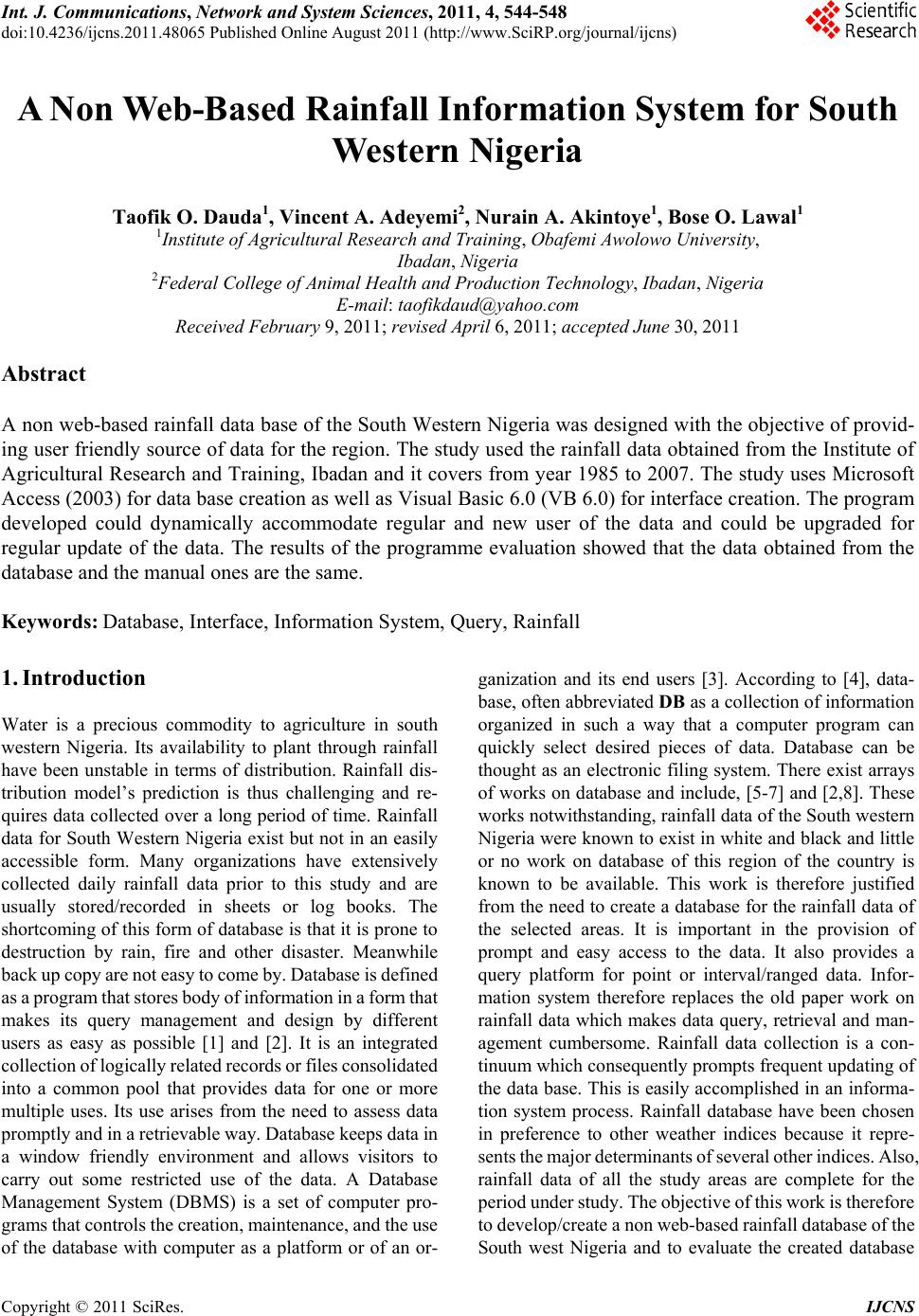
Int. J. Communications, Network and System Sciences, 2011, 4, 544-548
doi:10.4236/ijcns.2011.48065 Published Online August 2011 (http://www.SciRP.org/journal/ijcns)
Copyright © 2011 SciRes. IJCNS
A Non Web-Based Rainfall Information System for South
Western Nigeria
Taofik O. Dauda1, Vincent A. Adeyemi2, Nurain A. Akintoye1, Bose O. Lawal1
1Institute of Agricultural Research and Training, Obafemi Awolowo University,
Ibadan, Nigeria
2Federal College of Animal Health and Production Technology, Ibadan, Nigeria
E-mail: taofikdaud@yahoo.com
Received February 9, 2011; revised April 6, 2011; accepted June 30, 2011
Abstract
A non web-based rainfall data base of the South Western Nigeria was designed with the objective of provid-
ing user friendly source of data for the region. The study used the rainfall data obtained from the Institute of
Agricultural Research and Training, Ibadan and it covers from year 1985 to 2007. The study uses Microsoft
Access (2003) for data base creation as well as Visual Basic 6.0 (VB 6.0) for interface creation. The program
developed could dynamically accommodate regular and new user of the data and could be upgraded for
regular update of the data. The results of the programme evaluation showed that the data obtained from the
database and the manual ones are the same.
Keywords: Database, Interface, Information System, Query, Rainfall
1. Introduction
Water is a precious commodity to agriculture in south
western Nigeria. Its availability to plant through rainfall
have been unstable in terms of distribution. Rainfall dis-
tribution model’s prediction is thus challenging and re-
quires data collected over a long period of time. Rainfall
data for South Western Nigeria exist but not in an easily
accessible form. Many organizations have extensively
collected daily rainfall data prior to this study and are
usually stored/recorded in sheets or log books. The
shortcoming of this form of database is that it is prone to
destruction by rain, fire and other disaster. Meanwhile
back up c opy are not easy t o com e by. Datab ase is defi ned
as a program that stores body of information in a form that
makes its query management and design by different
users as easy as possible [1] and [2]. It is an integrated
collection of logically related records or files consolidated
into a common pool that provides data for one or more
multiple uses. Its use arises from the need to assess data
prompt ly and i n a ret rie va ble way . Dat aba se keep s d ata in
a window friendly environment and allows visitors to
carry out some restricted use of the data. A Database
Management System (DBMS) is a set of computer pro-
grams that controls the creation, maintenance, and the use
of the database with computer as a platform or of an or-
ganization and its end users [3]. According to [4], data-
base, often abbrev iated DB as a collection of information
organized in such a way that a computer program can
quickly select desired pieces of data. Database can be
thought as an electronic filing system. There exist arrays
of works on database and include, [5-7] and [2,8]. These
works notwithstanding, rainfall data of the South western
Nigeria were known to exist in white and black and little
or no work on database of this region of the country is
known to be available. This work is therefore justified
from the need to create a database for the rainfall data of
the selected areas. It is important in the provision of
prompt and easy access to the data. It also provides a
query platform for point or interval/ranged data. Infor-
mation system therefore replaces the old paper work on
rainfall data which makes data query, retrieval and man-
agement cumbersome. Rainfall data collection is a con-
tinuum which consequently prompts frequent updating of
the data base. This is easily accomplished in an informa-
tion system process. Rainfall database have been chosen
in preference to other weather indices because it repre-
sents the major determinants of several other indices. Also,
rainfall data of all the study areas are complete for the
period un der study. The objec tive of this work is t herefore
to develop/ create a non web-b ased rainfal l dat abase of the
South west Nigeria and to evaluate the created database